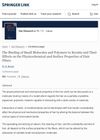 January 2020 in “bioRxiv (Cold Spring Harbor Laboratory)”
January 2020 in “bioRxiv (Cold Spring Harbor Laboratory)” Semecarpus anacardium leaf extracts may offer safe, effective cancer treatment alternatives.

Human hair keratins can self-assemble and support cell growth, useful for biomedical applications.
 January 2019 in “Journal of Pharmacognosy and Phytochemistry”
January 2019 in “Journal of Pharmacognosy and Phytochemistry” The methanolic fruit extract of Citrullus colocynthis contains bioactive compounds that may support its use in traditional medicine and drug development.
 January 2019 in “Applied Organometallic Chemistry”
January 2019 in “Applied Organometallic Chemistry” The compound (NH4)2Mn0.17Cu0.83Cl4.2H₂O has a specific structure, shows weak magnetism at low temperatures, and undergoes phase changes at high temperatures.
 June 2018 in “International journal of trend in scientific research and development”
June 2018 in “International journal of trend in scientific research and development” The review explains how hair products work and the science of different hair types to help improve hair care research.

The document explains how certain drugs block hormones to treat cancers like breast and prostate cancer.
 September 2013 in “Daehan hwajangpum hakoeji/Daehan hwa'jangpum haghoeji”
September 2013 in “Daehan hwajangpum hakoeji/Daehan hwa'jangpum haghoeji” Shampoo with ginseng helped improve hair thickness, density, growth, and reduced hair loss.
 January 2013 in “Springer eBooks”
January 2013 in “Springer eBooks” Hair care products are important for appearance and self-esteem, and choosing the right ones can help maintain healthy hair.
 March 2011 in “Focus on surfactants”
March 2011 in “Focus on surfactants” Several companies launched new hair care ingredients in 2011 to improve conditioning, color retention, combability, and heat protection.
 January 1997 in “Elsevier eBooks”
January 1997 in “Elsevier eBooks” The document explains how shampoos clean, rinses condition, one-step shampoos offer convenience, and hair growth promoters aim to prevent hair loss, emphasizing the importance of scientific evidence for their effectiveness.
 September 1995 in “American Journal of Contact Dermatitis”
September 1995 in “American Journal of Contact Dermatitis” Antiyeast treatments work better for seborrheic dermatitis than steroids, and other findings include increased skin bacteria under plastic wrap, a nasal cell defect in Staphylococcus aureus carriers, quick resolution of certain skin reactions, high rubber latex allergy in spina bifida patients, and glyceryl monopentadecanoate's effectiveness for male hair loss.
29 citations,
May 2007 in “International journal of pharmaceutics” Different compounds move through artificial sebum at different rates, which can help choose the best ones for targeting hair follicles.
 70 citations,
January 2000 in “Drug Development Research”
70 citations,
January 2000 in “Drug Development Research” New butyric acid prodrugs show promise for cancer treatment, anemia management, and protecting hair from chemotherapy damage.
31 citations,
July 2012 in “Journal of Lipid Research” ACBP is crucial for healthy skin in mice.
25 citations,
May 2019 in “Cosmetics” 18-MEA and cationic surfactants can restore and maintain hair's hydrophobic nature, improving its beauty and feel.
 9 citations,
March 2022 in “Antioxidants”
9 citations,
March 2022 in “Antioxidants” Synthetic antioxidants are effective, cheap, and stable, with some like zinc and cholecalciferol reducing child and cancer deaths, but the safety of additives like BHA, BHT, TBHQ, and PEG needs more research.
 7 citations,
January 1981 in “Springer eBooks”
7 citations,
January 1981 in “Springer eBooks” Certain small molecules and polymers can change hair's physical properties and how it feels by affecting the bonds within the hair.
 1 citations,
July 2022 in “Journal of Drug Delivery Science and Technology”
1 citations,
July 2022 in “Journal of Drug Delivery Science and Technology” Niosomes and ethosomes can effectively carry the drug spironolactone, potentially improving treatment for hair loss and reducing side effects.
November 2023 in “IntechOpen eBooks” Arsenic exposure from contaminated water severely damages the skin, causing hair loss, pigmentation changes, irritation, and can lead to skin cancer.
129 citations,
January 2004 in “Journal of medicinal chemistry” Researchers developed new compounds that target the androgen receptor effectively with fewer side effects.
 96 citations,
September 2021 in “International Journal of Molecular Sciences”
96 citations,
September 2021 in “International Journal of Molecular Sciences” Chitosan, a natural substance, can be used to create tiny particles that effectively deliver various types of drugs, but more work is needed to improve stability and control of drug release.
79 citations,
December 2017 in “Cosmetics” Effective sunscreen formulations can reduce skin absorption and enhance protection.
63 citations,
February 2017 in “ACS biomaterials science & engineering” Polydopamine is a safe, effective, and permanent hair dye that turns gray hair black in one hour.
 57 citations,
October 2021 in “Journal of ethnopharmacology”
57 citations,
October 2021 in “Journal of ethnopharmacology” Indian herbal medicine shows promise for treating skin diseases but needs more research to prove effectiveness.
54 citations,
June 2020 in “Pharmaceutics” New nanocarriers improve drug delivery for disease treatment.
53 citations,
July 2016 in “Cosmetics” Future hair cosmetics will be safer and more effective.
49 citations,
November 2021 in “Annual review of pathology” Lysophospholipids like LPA and S1P are important for hair growth, immune responses, and vascular development, and could be targeted for treating diseases.
 33 citations,
July 2021 in “Clinical, Cosmetic and Investigational Dermatology”
33 citations,
July 2021 in “Clinical, Cosmetic and Investigational Dermatology” Nanocarrier technology in cosmetics improves ingredient delivery and effectiveness while reducing side effects.
32 citations,
September 2018 in “Journal of pharmaceutical sciences” The model better predicts how water-loving and fat-loving substances move through the skin by including tiny pores and hair follicle paths.
 20 citations,
June 2022 in “Molecules”
20 citations,
June 2022 in “Molecules” Thiazole, a sulfur and nitrogen chemical, is useful in creating potential drugs for conditions like seizures, cancer, bacterial infections, tuberculosis, inflammation, malaria, viruses, Alzheimer's, diabetes, and A1-receptor issues.



















